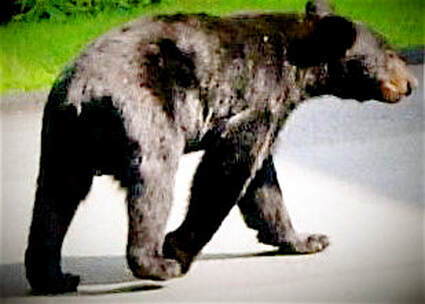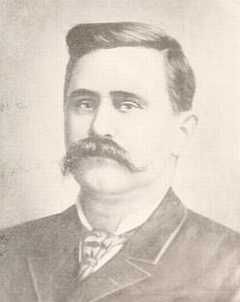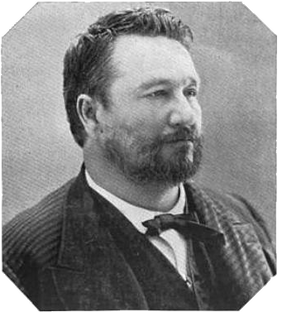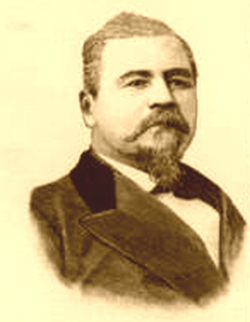|
Public Domain Photo, courtesy of Emmet Starr, History of the Cherokee Indians
This is the seventh in a series of blog posts offering brief information on every constitutionally-elected Principal Chief of the Cherokee Nation since 1828. [Though this series portrays constitutionally-elected Principal Chiefs, Chief Harris was included here due to the importance of the ceding of the Cherokee Outlet (Cherokee Strip)] Colonel Johnson Harris, born 19 April 1856, in Forsyth County, Georgia, was a grandson of Parker Collins, one of the early “mixed blood” Cherokees of the early Cherokee Nation. His father was a Caucasian named William Harris, his mother, Susan Collins, a Cherokee. Colonel (his given name, not a rank) Harris was an enrolled Eastern Cherokee who eventually made his way to the Indian Territory. Like many Cherokee of the day, he married more than once due to early spousal deaths. In 1880, at twenty-three, Harris was selected as a senator in the Canadian District for the Cherokee National Council. In 1887, he was chosen as a delegate to travel to Washington, D.C. for the purpose of perpetuating tribal business. By 1890 he was serving as Executive Secretary to the Cherokee Council. In 1891, following the death of Chief Mayes, he was appointed Principal Chief. During his tenure, Harris participated in the relinquishment of the Cherokee Outlet, or Cherokee Strip, which encompassed what is now known as the Oklahoma Panhandle. The United States government pressured the Cherokee Nation (a frequent occurrence) and purchased it for 8 ½ million dollars. Colonel Harris died 25 September 1921 and is buried in Tahlequah City Cemetery. ***Bryan D. Jackson’s new release, Chattahoochee Rain (ages 12 and up), is on sale now. It is a historical fiction account that paints a portrait of events during the months leading up to the Treaty of New Echota and features some of Bryan’s direct ancestors.
1 Comment
Public Domain Photo - Courtesy of the U.S. Census Bureau
This is the sixth in a series of blog posts offering brief information on every constitutionally-elected Principal Chief of the Cherokee Nation since 1828. Joel Bryan Mayes was a Georgian, born 2 October 1833 to Samuel and Nancy Adair Mayes. Reports have indicated that the family relocated to Indian Territory in 1838, during the time of the Trail of Tears. Mayes attended the Male Seminary in Tahlequah in 1851 and graduated in 1855. He taught school for a while before moving to the Cooweescoowee District and entering the cattle business. In 1855, he married Martha Candy, who died in 1857. Mayes enlisted as a private in the 1st Cherokee Regiment in the Confederate Army during the Civil War. By 1862, he attained the rank of captain and was the Assistant Quartermaster of the 2nd Regiment of Cherokee Mounted Volunteers. Two years later he was promoted to Major and assigned to the 1st Indian Brigade by General Stand Waitie. In 1863, Mayes married Martha McNair , who died in 1866 while they were living in the Choctaw region. After the war, he moved to Texas with his family. In 1869, Mayes married a widow, Mary Delilah Vann Drew. Mayes began his political career as clerk of the Cooweescoowee district court in 1869. In 1881, he was appointed clerk of the citizenship court, which led him to later serve as clerk of the Cherokee Council. He was subsequently posted as an associate justice of the Cherokee Supreme Court, serving for one year before being elected as Chief Justice. On 1 August 1887, Mayes defeated Rabbit Bunch of the National party for Chief of the Cherokee Nation. A contested election, controversy surrounded the circumstances, leading Congress to intervene and create a federal court for the Indian Territory, undercutting previous tribal court authority. Mayes was reelected to a second term on 3 August 1891. He died shortly thereafter, at his home in Tahlequah on 14 December 1891. Mayes is buried in the Tahlequah City Cemetery, in what is now Cherokee County, Oklahoma (Oklahoma becoming a state in 1907). ***Bryan D. Jackson’s new release, Chattahoochee Rain (ages 12 and up), is on sale now. It is a historical fiction account that paints a portrait of events during the months leading up to the Treaty of New Echota and features some of Bryan’s direct ancestors. (Photo courtesy of Wiki Commons - public domain photo)
This is the fifth in a series of blog posts offering brief information on every constitutionally-elected Principal Chief of the Cherokee Nation since 1828. Dennis Wolf Bushyhead, or Unadena (Cherokee for “woolly head”), was born 18 March 1826 near today’s Cleveland, Tennessee. He was the son of Eliza Wilkinson of the Wolf Clan and The Rev. Jesse Bushyhead, a Cherokee Baptist minister. For his early education, he was sent to Candy Creek Mission in Tennessee. Later, he attended the Mission School in North Carolina under the tutelage of The Rev. Evan Jones. In 1838, his father conducted one of the detachments on the Trail of Tears, and the family settled in the Delaware District in Indian Territory. He served as a clerk for Lewis Ross, brother of Chief John Ross, from 1844-1847. He then served an additional year as clerk for the Cherokee Senate. A year after the Californian Gold Rush began, Bushyhead left home for the gold fields that attracted so many. Later, Bushyhead returned to the Indian Territory (I.T.). He was elected treasurer of the Cherokee Nation for four years. In 1879, he was elected Principal Chief. He served until 1887. During his term he vetoed a bill that would have prevented Cherokee Freedmen from sharing in tribal proceeds, pointing to the treaty of 1866 that stipulated the Freedmen would have permanent citizenship rights. He married Elizabeth Adair (nee Schrimsher) in 1869, and, in 1883, a year after her death, he married Eloise Butler. Bushyhead had six children from the two marriages. Chief Bushyhead died on 4 February 1898, in Tahlequah, I.T. (later Oklahoma). He is buried in the Tahlequah City Cemetery. ***Bryan D. Jackson’s new release, Chattahoochee Rain (ages 12 and up), is on sale now. It is a historical fiction account that paints a portrait of events during the months leading up to the Treaty of New Echota and features some of Bryan’s direct ancestors. |
Yona Ambles"YOH-nuh" (yonv) means "bear" in Cherokee. Thanks for visiting! Archives
January 2024
|




 RSS Feed
RSS Feed
